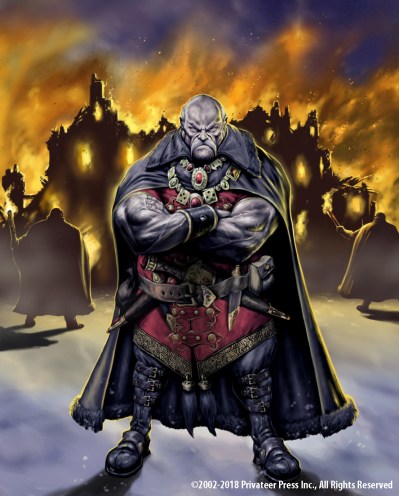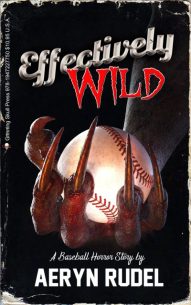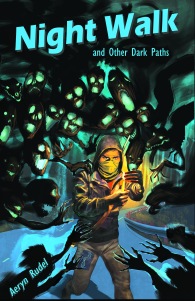Old Friends, New Blood
Hey, Iron Kingdoms readers, got something special for you today. In the past, I’ve put up stories that were published in the pages of No Quarter magazine or part of organized play for Privateer Press, but this is a completely new and unpublished Iron Kingdoms short-short story that has never been read by anyone outside of the Privateer Press editorial staff. That same editorial staff has given me the go-ahead to share it with you. (Thanks, Mike. Thanks, Doug.)
So let’s head to war-torn Llael for “Old Friends, New Blood.”

Old Friends, New Blood
By Aeryn Rudel
“Your weapons,” the guard said and pointed to a low table beside the door. He was little more than a boy, and the casual, almost bored tone of his request rankled Fyodor Goska.
“Do you think I mean to put a knife in Kovnik Ivachev?” Fyodor stepped close. “Do you think you could stop me?”
The guard stiffened, and his hand fell to the haft of his axe. For a brief moment, Fyodor toyed with letting him pull it off his belt. Then he placed one broad hand on the boy’s shoulder, laughed and unbuckled the broad belt that held his knives. “You are too serious, soldier.”
The guard relaxed. “Thank you, sir.” Fyodor heard respect now, and, he noted, the appropriate amount of fear.
He put his weapons on the table, and the guard opened the door to the kovnik’s office. Fyodor found Ivachev behind his desk, head down over some document. The room was sparsely appointed, but the few pieces of furniture looked expensive. Gregor Ivachev was the same age as Fyodor and nearly as big. He loomed behind his desk, a gray-haired warlord out of place in these clerical surroundings. “Fyodor,” he said and stood. “Good to see you, old friend.”
Fyodor nodded. “It has been a long time since we met face to face.”
“Too true, but there are certain protocols that must be followed.” Ivachev gestured to one of the chairs in front of his desk.
Fyodor moved closer but did not sit; instead, he gripped the back of the offered chair and leaned forward. The pose made the big muscles in his arms and shoulder bulge. “Protocols you have now violated.”
Ivachev frowned. “I am aware. I did so because you are my friend.”
“Is that what I am?” Fyodor said. “Maybe, once, on the streets of Korsk, when we were young.”
“I do not regret leaving the bratya,” Ivachev said. “Just as you do not regret staying. We chose different paths, but here we are, together.”
“Very well,” Fyodor said. “Speak on, friend.”
“You have done good work for us in Llael,” Ivachev began. “I am pleased with your many successes—“
“Before your office reeks of horse shit, get to the point,” Fyodor said.
The kovnik smiled. “I have spent too long among dignitaries and aristocrats.” He cleared his throat. “The incident at the docks has given some in the High Kommand reason to doubt the effectiveness of your men.”.
Fyodor laughed, short and sharp. “You mean the incident where the Khadoran military failed to inform me the insurgents were led by a warcaster? The incident where I lost eight men and my son lost a leg?”
Ivachev drew in a deep breath. “I know what happened could not be avoided, Fyodor. But some in Merywyn do not approve of the use of the bratyas to enforce our rule. They seek any excuse.”
“And I am that excuse, eh?” Fyodor said and spat. “My men and I have served you well, Gregor. You know this.”
“I do, and you must not forget we have both profited by our agreement.” Ivachev pointed one thick finger at Fyodor.
“Then how do we maintain our agreement in light of my failure?”
“That is why I called you here,” Ivachev said. “I have convinced those with doubts in the High Kommand to give you another chance, let you prove your worth. I wanted to tell you personally.”
“I have been underboss for twenty years,” Fyodor said, shaking his head. “I took that position and maintained it by proving myself, again and again, to my men, to rival bratyas, and to you, Gregor. What more must I prove?”
“To me? Nothing,” Ivachev said. “To those who doubt, you must kill someone.”
Fyodor shrugged. “The blades of my bratya are red and wet.”
“What of your own blades?”
For a moment, Fyodor could not speak. The question struck him like a hammer blow. His vision swam with images of closing his fingers around Ivachev’s throat and squeezing the life from him. “You dare . . .” was all he could manage, but his glare would have loosened the bowels of most men.
Ivachev was not most men, and he held Fyodor’s murderous gaze, unflinching, and slid a folder across his desk. “Kill this man. By your own hand. No one will doubt you again.”
Fyodor sucked in a great gulp of air and took a tight rein on his anger—it would not serve him here. He picked up the folder but did not look at its contents. “It will be done,” he said, his voice flat and measured.
Ivachev nodded. “I am sorry it has come to this. I wish it were otherwise.”
“I am sorry too, old friend.”
***
It had been some time since he stalked a target on his own. It felt good to worry about nothing but himself and his quarry.
The man he would kill this night thought himself invulnerable in his grand house along the river, his station shielding him from harm like a suit of Man-O-War armor. Fyodor would prove him wrong.
Only one guard patrolled the grounds, making a slow circuit around the outer wall. Fyodor watched him from the shadows, waiting for the right moment. It came soon enough. The guard stopped, set his rifle against the wall, and unbuckled his pants. The splash of urine against the stone covered Fyodor’s approach. He clamped one hand around the man’s mouth, wrenched his head back, and slashed his throat. The blood emptied in steaming gouts, and Fyodor pushed the body into the shadows at the base of the wall. Then he leaped, grasped the top of the ten-foot barrier with one hand, and pulled himself up and over. He dropped to the cobblestones on the other side in a tight, controlled roll, then crossed the courtyard to the house.
Fyodor made his way to the rear of the building and found a servant’s entrance. Unguarded. Beyond lay a short hallway, leading to an antechamber and a broad stairway.
He climbed the stairs, both long knives in hand. At the top stretched another hallway, this one with many doors to the left and right. He ignored them. The door at the end of the hall was his destination. Warm yellow light spilled from beneath it, and he heard voices beyond.
He flipped one of his blades over into a throwing grip and kicked open the door. His hand flashed down, the knife spinning from it on a lethal arc. The weapon struck one target with a dull thud as he stepped into the room and he surged toward the other.
Ivachev stared in horror, his mouth a round O of surprise. The boy who had stood guard outside his office the other morning lay on the floor before the kovnik, Fyodor’s knife buried to the hilt in his chest. The boy’s eyes were wide, terrified, and he tried in vain to pull the knife from his heart.
Ivachev had a pistol at his belt, but he’d been too long away from the streets of Korsk, and the lessons it taught, one of which was a knife is always quicker than a gun in close quarters. The gun came up, too slow, and Fyodor smashed it aside. He lashed out with a heavy boot, and kicked Ivachev’s feet out from under him. The kovnik crashed to the floor, and Fyodor followed him down, planting a knee in Ivachev’s chest, pinning him. He put a knife at the kovnik’s throat.
The boy had stopped moving and lay still in a wide pool of scarlet.
“Why?” Ivachev said.
“More than a leg,” Fyodor whispered. “But we pay our blood debts in full and then some, do we not? It was your information that cost me so dear.” He leaned down, pushing his face inches from Ivachev’s. “Your information that caused some to lose faith in you.”
Ivachev opened his mouth to say something, but Fyodor had finished talking. He opened his old friend’s throat with a quick sawing cut, then held him down while he bled out.
When it was over, Fyodor retrieved his blade from the body of young Marcus Ivachev, then returned to the corpse of his father and wiped his blades clean on Ivachev’s uniform. “You were right about one thing, Kovnik. I did have to kill a man.”





